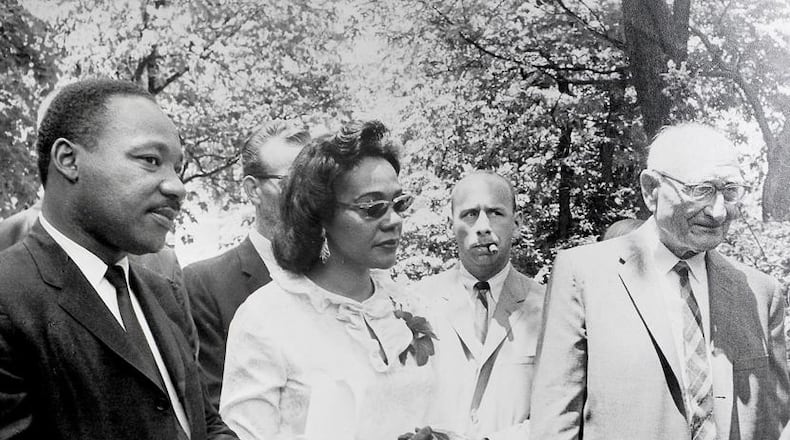Though progress has been made, King’s message is one that still resonates today with people of all races, said Edward Twyman, director of Wright State’s Bolinga Black Cultural Resources Center.
“Even today, I am still in awe of the power, impact and relevancy of his speeches,” Twyman said. “Those issues he fought for 50 years ago are still relevant today.”
King was assassinated at 6:01 p.m. on April 4, 1968 at the Lorraine Motel in Memphis, Tenn. Today, the nation will commemorate the death of the civil rights leader. Across this region, organizations, businesses and college will celebrate the significant events in King’s life with planned events and remembrances.
He was 39-years-old when he died and to honor King’s work, churches and organizations throughout southwest Ohio and the country will ring their bells 39 times. Bells in Memphis will ring at the exact time of King’s death while bells in Ohio will ring at 6:05 p.m. and throughout the rest of the world at 6:07 p.m. to represent how the news of his assignation rippled across the globe.
A national 50-second moment of silence also is planned that same evening.
PHOTOS: Check out this nearly $1M Beavercreek home with outdoor pool
“The memory of someone’s birth is not important but the memory of someone’s death is much more important because its about what they’ve done and who they are,” said Daryl Ward, pastor at Omega Baptist Church. “That’s why April 4 is so important to me.”
Locally, Carillon Park, the University of Dayton, Wright State University and Omega Baptist Church are expected to participate and organizers said dozens of others will too.
The commemoration is a “fitting tribute” to King, said Brady Kress, president and CEO of Dayton History which oversees Carillon Historical Park. The park has tolled its bells to mark just a few occasions, including the anniversary of the death of former president John F. Kennedy as well as the attacks on Pearl Harbor and Sept. 11, 2001, Kress said.
“This is one that we thought we’d do and was the right thing to do,” said Brady Kress, president of Dayton History. “We wanted to pay our respects.”
King visited the Dayton region several times and has dozens of connections to the area.
He gave commencement speeches at Central State University, Wilberforce University and Antioch College. His wife, Coretta Scott King, was also an activist and graduate of Antioch, where a building now bares her name. In 1964 King spoke at UD and he was also presented the key to the city.
RELATED: Ohio State says a high GPA works against young women job hunters
Along with the bell toll, both Wright State and UD will host activities to honor King.
At Wright State, students will be able to watch a live stream of programs taking place at the National Civil Rights Museum beginning at 11 a.m. and students and community members will gather at the campus ministry center at 7 p.m. to reflect on King’s death, according to the university.
UD hosted a viewing of the last speech King right before he was assassinated on Tuesday and the public is invited to gather at the university’s memorial to King for a brief remembrance at noon today followed by a procession to a 12:30 p.m. Mass. Terri Freeman, a UD alumna who serves as president of the National Civil Rights Museum will speak at an event int he Kennedy Union ballroom at 7 p.m., April 12, according to the university.
The year of King’s assassination — 1968 — was a challenging one for Americans, said said Roger Crum, a UD art history professor and member of the school’s planning committee that helped organize the April events for King. In a lot of ways, the tensions of 1968 are similar to cultural and racial issues that erupted recently in response to police brutality and the violence in Charlottesville, Virginia, he said.
“These are not strictly historical issues. They remain contemporary issues,” Crum said.
RELATED: Ohio University planning big changes for Greene County location
About the Author
